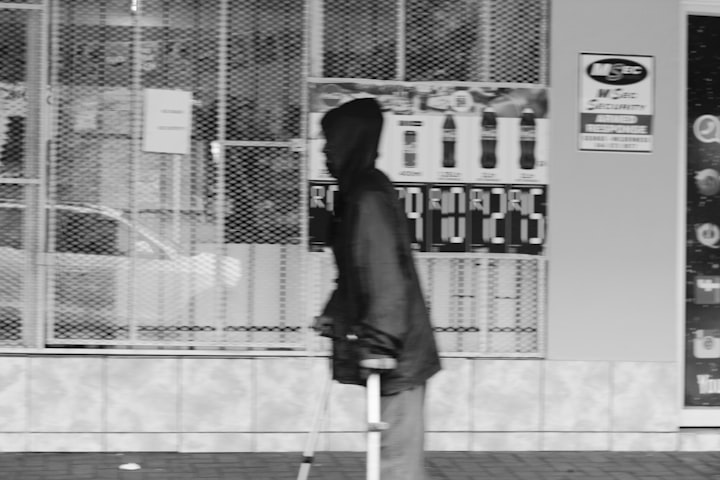Standing and Walking
Living with Becker's Muscular Dystrophy has taught me many things. The most important lesson I've learned is that you have to keep standing and walking.

Pain. Lots of pain. When you have a neuromuscular disorder, pain becomes a part of your daily existence. Sometimes the pain is dull, an ache in the calf, a twinge in the shoulder. Sometimes the pain is acute, a fire spreading through your entire nervous system. There is always the option to stay in bed, to stare at the ceiling fan as it goes through its rotations, simply riding out your personal misery in desperate silence. Staying in bed is an option, letting the hours tick by, watching one day roll into the next, never doing anything.
But by staying in bed, not only are you inviting stiffness and atrophy, you are also opening the door for another type of pain. You’re accepting deep psychological agony, casting your soul down into one of the seven circles of hell, placing yourself within the oubliette. So, you stand, you walk, you make yourself a cup of coffee, you take a shower. After all that, you stop for a break, resisting the enticements of the bed or the easy chair. Stopping forces you to face that same temptation over and over again.
It’s easier to go back to sleep, because sometimes when you sleep, you dream, and sometimes those dreams are pleasant, painless, but even dreams come with a downside. Eventually, you’re going to have to wake up and confront the truth again. This is your reality. You will never be able to run, to jump, to go on the same adventures you went on in your dream. The will is there, don’t get me wrong. The will is there to climb Mount Rainier, but the means are not always available.
You tell yourself that one day, one day you’re going to do the thing you’ve always wanted to do. It is fine to set this goal for yourself, to keep hope alive amidst the misery. Yet practical thoughts always creep in. What if I get to this place or that place and there are steps I can’t climb, paths I can’t traverse? Mostly the thoughts that hold you back pertain to navigation. How will I get around? If I struggle, stumble, fall, will someone be there to help me?
Help is where practical thoughts meet emotional desires. Having a chronic disease makes you fear the future. You ask yourself questions, lots of questions, but mainly you ask yourself, who will be there for me? And if I do find someone, someone willing to stay by my side through all the upheavals, will they come to resent me? Will they eventually tire of the struggle and leave me behind? Questions of the heart are myriad and everyone, no matter their situation, asks those questions. I don’t know how frequently other people ask themselves those questions, but for me it is an everyday thing, occupying my thoughts from the moment I wake up to the moment I go to sleep.
No matter your circumstances, you will enter phases where you experience pain. The pain will sometimes be physical. You will break your bones, bruise your flesh, cut your skin. The pain will sometimes be psychological. You will feel despair, hopelessness, regret, fear, anger, and you will wonder why you keep going, why you keep trying, why you continue to court hope. You will ask questions. Why me? Why now? What did I do to deserve this? Why you, why now, I can’t answer those questions. What did you do to deserve this? Probably nothing. You’ll tell yourself that it is bad karma. Maybe you did something in the past or in a past life to deserve this. Doubtful.
The one thing I’ve learned from years of suffering and struggle is that it just happens. It doesn’t matter the kind of person you are. It doesn’t matter if you’ve been good, bad, indifferent, apathetic, unkind, deceitful. These things just happen and they happen to everyone, regardless of their karma, aura, chakras, how many times they pray.
So many of the trials you will face in your life will be beyond your control. How you deal with those trials, on the other hand, is a matter of choice. My advice: stand and walk. And when I say stand and walk, I don't necessarily mean on two feet. Standing and walking means facing the day, doing something with your time, never giving up. Rest when you need to, but do not crawl back into that bed because you think it will make you feel better. It will make you feel better for a glancing moment. But the more time you spend underneath those covers, the harder standing and walking becomes.
About the Creator
Mack Devlin
Writer, educator, and follower of Christ. Passionate about social justice. Living with a disability has taught me that knowledge is strength.
We are curators of emotions, explorers of the human psyche, and custodians of the narrative.






Comments
There are no comments for this story
Be the first to respond and start the conversation.